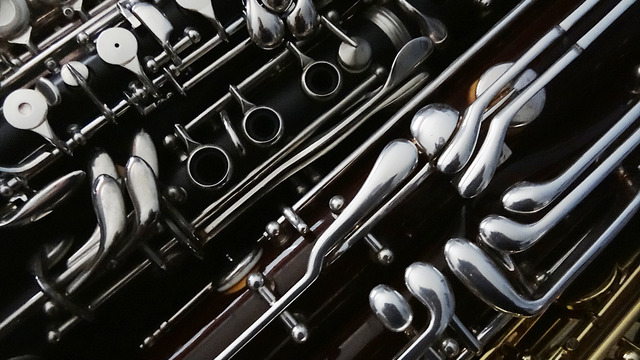Winds set sail in New World’s chamber program
“Where the Four Winds Blow” was the appropriate title for the New World Symphony’s final chamber musicale of the year Sunday afternoon. The program featured four bite-sized vignettes and a large concerted work from the Classical era, the afternoon providing a field day for the orchestra academy’s wind players who are often less prominently featured on these concerts than their string counterparts.
J.S. Bach’s Sonata in G major for two flutes veers from long-spun melodies to fast movements that require the soloists to play hundreds of notes at rapid speed. Kelly Zimba and Masha Popova were more than equal to the task. Their lovely tone in the airs and zesty articulation in the final Presto demonstrated mastery of the instrument. Continuo was mostly provided by Darren Hicks’ bassoon. Perhaps because the players were placed on a platform at the left side of the New World Center stage, John Wilson’s harpsichord was virtually inaudible.
Entre-temps for oboe and string quartet was a miniature sample of Toru Takemitsu’s personal brand of mysticism. Inspired by the writing of the Dadaist poet Tristan Tzara, the 1986 score blends thematic fragments from the string players with more melodic writing for the solo oboe. A series of dreamlike episodes flow together in a musical stream of consciousness, the spirit of Messiaen hovering over the work’s delicate textures. The exceptional tonal heft and beauty of Adéle-Marie Buis’ oboe playing was a standout in a fine rendering of a complex opus.
The Trio for clarinet, violin and piano is one of Gian Carlo Menotti’s last works and it is a real crowd pleaser. Composed over the course of a decade and finally premiered in 1996 (the composer, typically, completed the score the day of the first performance), the brief three movements mix jaunty, ironic tunes with vaguely Russian-tinged romanticism. Indeed the violin melody of the second movement Romance would fit well as the soundtrack of a Hollywood melodrama of the Joan Crawford-Jennifer Jones variety.
Clarinetist Zach Manzi’s precision and ease in the score’s witty writing for the instrument’s high register propelled the performance and the soaring, deeply burnished tone of Lauren Densinger’s violin did full justice to the melodious interludes. Wilson was a fine partner, his fleet pianism well calibrated .
The Divertissement for bassoon and string quartet by Jean Françaix is a charmer, typical of the French composer’s light style influenced by neo-classical Stravinsky and the music hall-classical fusions of Les Six. Françaix presents the bassoon’s sly, comedic side but also explores the instrument’s melodic paths with a haunting, very Gallic slow movement that is stylishly crafted. Brenton Foster delivered a rhythmically sharp solo performance, alive to the numerous changes of meter. His tonal beauty in the Lento served the French soufflé well, backed by first rate string players.
Concluding the pre-holiday program, the Sinfonia concertante for oboe, clarinet, bassoon and horn, attributed to Mozart, brought a contingent of 20 players sans conductor to the stage, in addition to the four soloists.
(Mozart wrote a similar work that utilized a flute rather than clarinet among the solo roles during his sojourn in Paris but the manuscript was lost. A century later a musicologist discovered a manuscript, not in Mozart’s hand, in a German library with the clarinet part. Whether that score is actually by Mozart has long been the subject of dispute but the piece certainly adheres to the spirit of Mozart and remains a splendid vehicle for wind players.)
Max Blair’s sweet-toned oboe, Miles Jaques’s deft clarinet, Sean Maree’s rich bassoon and, especially, Priscilla Rinehart’s agile horn contributed excellent solo work. Rinehart’s large sound and clean articulation in the instrument’s top reaches were highly impressive. There was finely shaped, accurate orchestral playing throughout the performance but a conductor might have infused more verve into the rollicking variations finale.
The New World Symphony’s chamber music series continues 2 p.m. February 28, 2016 with de Falla’s Harpsichord Concerto, Schmitt’s Lied and Scherzo, Ravel’s Piano Trio and soprano Julia Bullock as soloist in Ravel’s Three Poems of Stéphane Mallarmé and Sites auriculares and de Falla’s Psyche. nws.edu.
Posted in Performances
Leave a Comment
Mon Dec 21, 2015
at 12:05 pm
No Comments





